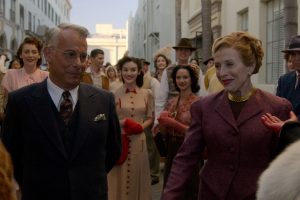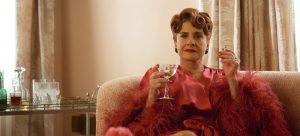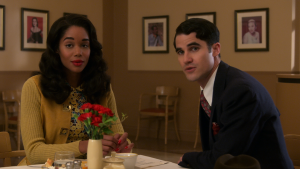I never reviewed The Politician, Ryan Murphy’s last big, melodramatic Netflix spectacle. For the record, I thought it was actually fairly good – a bit oddly paced, but not a bad series to binge-watch, and it was bolstered by a last-minute cameo from Bette Midler which served as setup for that series’ upcoming second season. But I made the choice not to officially review it, and, occasionally, I regret that decision. I will not make that same mistake with Murphy’s Hollywood, all seven episodes of which dropped on the streaming service yesterday. And that’s because Hollywood isn’t just a soapy drama about cutthroat political activists trying to outsmart each other in a Californian college campus Game Of Thrones – it actually is saying something. It has a hard time saying that something, a lot of the time, and it basically takes a sledgehammer to its own message, but it is trying. It is important, which The Politican never was, in my opinion.

It’d be hard to miss what that something is, to be quite clear, considering that, to put it nicely, the story’s themes are unmistakably interwoven into the plot (to put it not quite so nicely, the theme is a giant neon sign flashing in your face every couple of seconds, from beginning until end). It’s a good theme, thankfully: basically boiling down to the idea that movies and media can change the world, and that that’s why representation in those areas matters, because introducing audiences to what they would think of as “radical” ideas – such as, for instance, a black actress starring in a Hollywood blockbuster, or two men walking down the Oscars red carpet hand-in-hand – can help, subtly, to undermine bigotry and forms of prejudice wherever they lurk. In fact, it’s a really good theme – representation is something I have always tried to fight for, using what little platform I have, because I too understand the power of movies and TV. It’s the way in which Murphy goes about expressing this theme – by looking at an alternate reality in which a small group of diverse, idealistic dreamers and free-thinkers worked to radically change the structure of Hollywood in the late 1940’s or early 50’s, placing women, LGBTQ+ individuals and people of color in charge of the corrupt studio system – that can feel uncomfortably idealistic, as if Murphy is diminishing the stories of the real-life heroes and heroines who fought for social justice and equality in favor of his fictional cast. Murphy does get it right on multiple occasions, but it’s a very mixed bag, as you’ll see.
The series’ greatest asset is its all-star cast, which makes it ironic that its greatest weakness is its refusal to trust in their talents. Instead, an all-too-large number of scenes lean on clunky, hammy dialogue and monologuing, even though the actors delivering said dialogue are perfectly capable of conveying what they’re being asked to say with simple looks and gestures. Murphy’s fictional cast got the memo – one character in the show even directs her star to act with his eyes rather than using excessive hand-flailing – but somehow his real cast didn’t. For instance, one particularly cringy scene (which, let me emphasize, is cringy not because of what’s being said, but because of how it’s being said) involves a main character, black actress Camille Washington (Laura Harrier) turning to her white costar Claire Wood (Samara Weaving) and telling her “I don’t need you to fight my battles for me”, after experiencing racism from an auditorium usher. Such a sentiment could easily have been spoken with a single, meaningful glance: but the unnecessarily stilted language makes the scene fall flat, meaning that the good message gets lost or overshadowed. Far more powerful are the tense, largely silent scenes of diverse families across America tuning into an Oscars ceremony via radio to hear the winners announced, waiting through long lists of nominees (something Murphy gets right is poking fun at the ceremony for its excessive length and slow, pondering pace) to hear the names of their favorite movie-stars.

Speaking of the stars, let’s talk about them. David Corenswet’s Jack Castello, despite being a lovable and charming character, is, as a straight white male, probably not the best choice to lead a series that (a) aims to be all about diversity, and (b) has plenty of diverse supporting talent who could easily have been upped to the lead role: Laura Harrier, for instance, is often sidelined despite having the intriguing responsibility of playing a character playing a character playing a character, and many of her most exciting opportunities for development never even happen on camera – for instance, Oscar winner Hattie McDaniel (Queen Latifah) counsels the young actress at one point to fight a tooth-and-nails campaign for her first Academy Award, which sounds like it would be a lot of fun to watch and pretty empowering: but we never see it. Michelle Krusiec plays Anna May Wong, a Chinese actress who, in real life, lost out on a pivotal lead role in The Good Earth to a white actress who would go on to win an Oscar for the part: Krusiec’s take on the historical figure is promising in the first couple of episodes, and she’s set up to be a major character – but then she just disappears into the background cast. Other members of the ensemble include Darren Criss as white-passing, half-Filipino director Raymond Ainsley; Jeremy Pope as an idealistic young black, gay screenwriter named Archie Coleman; Jake Picking as closeted gay actor Rock Hudson; and Patti LuPone as Avis Amberg, the Jewish wife of a movie mogul (played by Rob Reiner in just three epiodes) who unwillingly settles into a position of power after her husband has a heart attack, only to discover she has a talent for business – Amberg’s small group of advisors, most notably Joe Mantello’s Dick and Holland Taylor’s Ellen Kincaid, are also lovely additions to the cast, and bring a good deal of genuine warmth and good-natured humor to the series. But I’d be lying if I said that one of my favorite cameos, for purely personal reasons, wasn’t an unexpected performance by The Lord Of The Rings‘ Billy Boyd as one of many closeted gay film executives at a party where we also meet notable Hollywood celebrities such as Tallulah Bankhead and Vivien Leigh (the former portrayed as flighty and fun-loving, the latter as a woman struggling with bipolar disorder).
So the cast is fantastic, of course. So is the series’ production design, costume design, cinematography – everything feels historically accurate…well, except for the actual story. If you ignore everything else, the series is actually a really fun look into the workings of the studio system, and what went into the casting process, and the making of movies. And there’s plenty of fun references to contemporary events and characters – one character derides Disney’s Song Of The South for its racist overtones; we meet the editor who secretly stowed away a copy of The Wizard Of Oz with the iconic “Somewhere Over The Rainbow” musical number intact after a producer insisted it be cut from the film; former First Lady Eleanor Roosevelt (Harriet Sansom Harris) shows up to make a characteristically memorable speech; the movie that Raymond Ainsley and his crew are making is a story about Peg Entwistle, an actress who committed suicide by throwing herself from the H in the Hollywoodland sign – though I find it very strange that, despite how prominent the story is and how frequently it gets referenced, despite the fact that the movie crew even builds a giant version of the H for their film set, despite the fact that the series intro even features all the main cast frantically climbing the Hollywoodland sign…in all seven episodes, no one actually attempts to commit suicide by jumping off the H. They build the entire set, and no one so much as threatens to climb to the top. I call that a wasted opportunity.

But now for the bad. In any story about Hollywood, #MeToo issues have to be brought up, and this series has a peculiar, even disturbing way of handling them. Jim Parsons delivers an unquestionably good performance as predatory talent manager Henry Willson, but that’s also part of the problem – he is unquestionably good. No matter how many times he sexually assaults and abuses his clients, manipulating, demeaning and blackmailing them, preying on people powerless to stop him, he is always portrayed as a good character, someone who finds himself on the right side of history because…why? Because he has a sob story that he monologues to Rock Hudson? Is that seriously all he had to redeem himself? Not to give away too many spoilers, but the fact that this series has the audacity to end with the resolution of Henry Willson’s storyline is repugnant: did no one behind the scenes think about what they were doing? Did no one stop and realize that the series cast also includes Mira Sorvino, herself an outspoken victim of sexual assault by Harvey Weinstein? Did no one think before making Henry Willson a major, sympathetic, character in a story about fighting Hollywood’s corrupt system? The fact that the jury is (at least according to some historians) still out on whether or not the real Willson actually abused his clients possibly makes it even worse: because that means Murphy made the choice to depict Willson a sexual predator in his series, and still decided to redeem him.
It’s an especially upsetting situation sad because so much of Hollywood is actually good and important: especially right now, with setbacks occurring every day. Representation in mainstream media is crucial, if we are to progress as a society – watching Hollywood reminded me of that, not only because we need more quality content with messages like the one in this series, but also because we need more quality content that doesn’t willfully undermine its own message by inexcusably apologizing for sexual abusers.
We’ve gotten to the point where a black woman can, potentially, win the Oscar for Best Lead Actress in a major studio production – but only one, Halle Berry, ever has, in the ceremony’s entire history. We still have a long way to go before it happens again, and I don’t know if a romanticized, fictionalized look into the past is the best way to ensure that it ever will.
Series Rating: 6.3/10

